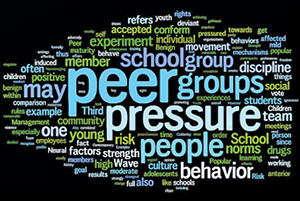
The term ‘peer pressure’ refers to children or teenagers engaging in behavior that they might not necessarily do on their own, due to the pressure of another individuals or peers. When discussing children and teenagers, pressure may refer to the self, the presence of others, or the social dynamic of the particular situation. Here are some common explanations for peer pressure and practical tips to help parents deal with it.
Past research indicates that teenagers are more susceptible to peer pressure because of a lack of frontal lobe development. This means that the areas in the brain most associated with reasoning and judgment are underdeveloped in teenagers, leading to a lack of foresight when they find themselves in pressure-related situations. For example, a teenager getting into a car with an under-aged driver, when he/she knows that it is against the law and very dangerous, did not carefully think through the consequences of what could happen if the driver gets into a car accident or is pulled over for a traffic violation. Another example is the teenager who is tempted to smoke or try particular drug, and thinks that there are no long-terms consequences to the act…like developing an addiction to it.
Recent research shows that controlling peer pressure requires parents and educators to gain a deeper understanding of how their child’s social and pleasurable experiences are intertwined. Shirley Wang in an article in the The Wall Street Journal in June, 2013, suggested that social acceptance sets off pleasure receptors in the brain to produce a certain degree of pleasure that requires action. So when a teenager is with a group engaging in a specific behavior; the need for approval is so pleasurable that it suppresses the judgment or reasoning that may be required to avoid a problematic situation. The pleasure that a teenager gets from social approval makes the brain and body feel great, leaving the child believing he made a correct decision, when in fact, s/he may have made a choice without taking ample time–or having the foresight–to consider the consequences.
There are many things that parents and educators can do to help kids cope with peer pressure. Parents can speak to their very young children to prepare them for peer-pressure-like situations. Providing a child with a script in his or her brain can go a long way to help them fight overcome peer pressure, especially when asked to do something “wrong.” Let’s give a few examples:
1) If parents see a problem with a particular friendship, they should explain to their child why they feel the friend is having a negative influence on him or her. They should listen to their children, and allow them to validate that friendship and explain why it is important to them, but you must remember you, as the parent, are in control! But when you are dealing with teenagers, it becomes difficult because many of them view their friendships and social interactions as more important than the advice and ideas of their parents.
2) Parents can provide a script or a framework to help their child deal with a potential negative situation. Say the family, or the child on his/her own, is attending a bar/bat mitzvah of a classmate, parents should let children know what kind of proper behavior is expected of them. For example, they should stay in their seats for the speeches, and not play with their cellphones during the reception, even if their friends are doing that.
True, you are asking a lot, and it will not be easy for the child who will feel a lack of for missing out on something, but as parents, you have provided a framework to the child and have validated that it is going to be difficult. You have also provided a strategy before the fact, so the child knows what you expect him or her to do when he/she sees everyone else pulling out their phones during the speeches, and will perhaps get some measure of pleasure from pleasing their parents.
Mark Staum, LCSW is the school therapist for the PTACH program @ MTA. Mark also maintains a local private practice where he specializes in working with children develop tools and techniques to manage anxiety, social challenges and family adjustments. Through cognitive behavioral treatments, mindfulness, and stress management, Mark empowers children to overcome their fears and manage social, emotional and academic stress. Mark also consults with families and provides solution based techniques to improve family communication and family dynamics. If you wish to schedule an appointment or speak with Mark about any related issue, please contact him at mstaumlcsw@gmail.com
By Rabbi Mark Staum










